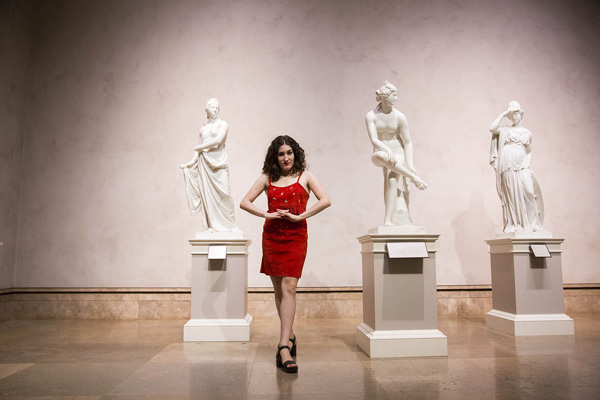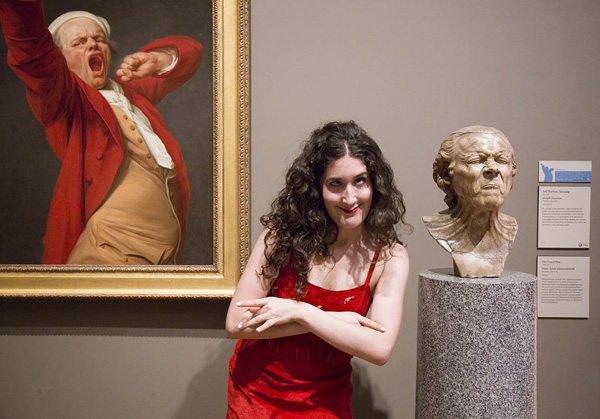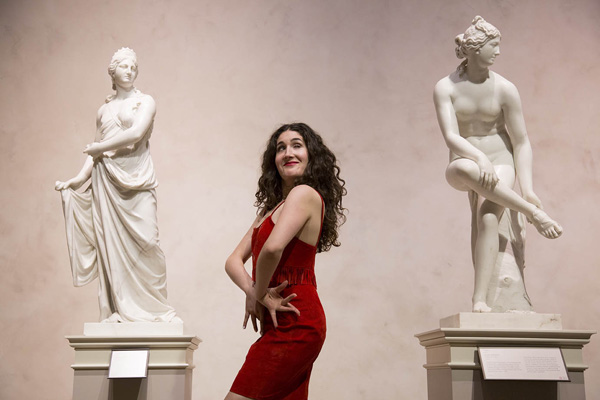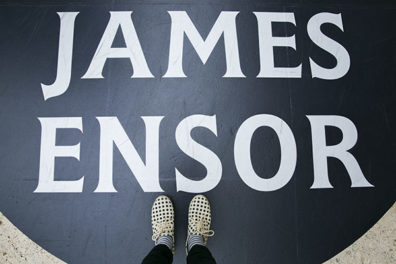
Comedian Kate Berlant recently visited the Getty to perform at Friday Flights, a series of eclectic evenings curated by local artists. Kate is known for her stream-of-consciousness comedy style and her amazing stage presence, which Jezebel recently likened to “the loopy and manic confidence of motivational speaker.”
I grabbed Kate after one of her comedy sets to profile her for #GettyInspired, our new series about creative people and their inspirations, and demanded that she tell me what inspiration means. Here’s what happened.
Who are you?
I’m a comedian, actor, and writer. And I own the Getty, which I’m not really public about.
Great, a confession to start. Moving on, what is inspiration?
Well, the root word is of course inspo… [pause] Help! Why is it so hard to talk about? It’s so strange. It’s like there’s no way to talk about it without embarrassing yourself, or something.
Someone told me that they’ve never even thought about the word since eighth grade.
Well, it’s funny, because today I heard someone say to someone else, “What are you passionate about?” And I was like, I have not heard anyone say that.
I was thinking about the first Ace Ventura movie with Jim Carrey, and the opening sequence where he’s throwing around that box he’s delivering—that was earth-shattering for me. I remember pausing and rewinding and rewatching. I was so attracted to the physicality of it.
I think I’ve always tried to burst through any and all moments by making some grotesque face or gesture, or just being physical, and it’s physical performers I’m always really drawn to.
When I was here at the Getty seeing the James Ensor show, all the faces were so funny and kind of unbearable to look at in certain ways, and I was excited by that.

What about grotesque faces is interesting to you?
I can’t really separate this from my own feelings as a woman of wanting to be pretty, and then interrupting that by making a hideous face. I remember being maybe fifteen and I would do these faces, and my mom was like, “Is that voluntary?” She was worried that it was an involuntary tic. And I was like, no. I’m deliberately trying to interrupt how you consume me. So I think that’s kind of how it started for me. I’ve always had a fear of being too much, or too excessively expressive, so I’m just drawn to that kind of excess, I guess.
Sorry, I just got off stage, so I’m very raw. I was just saying that the most alienating time in life is immediately following a performance of any kind.
Do you think you’re more honest after a performance?
I could be. Or I’m hyper-rigid. There’s a rigidity you’ll notice in my voice and word choice, and I think that’s a direct product of having just left the performance mode, which one never leaves, when you think about it.
So is inspiration a thing you don’t even really care about?
Anything I’m writing, or my videos, the origin for me always is in live performance. I improvise a lot, and that involves a certain amount of having to be comfortable with failure, with silence, and silence used to really scare me. That’s where I started to find more interesting moments, and it became more exciting to me to do something that was confusing or complicated or a little more memorable than necessarily just funny. I mean, I still want to be funny. It’s a failure if it’s not funny and people aren’t laughing, but it’s rewarding to do something. Just having people remember what you did.
Say more about what draws you to being “confusing and complicated.”
Well, stand-up is about resisting confusion. It’s about clarifying boundaries. I’m over here; you’re over there. I love lots of very conventional stand-up, but interrupting that direct consumption is interesting and also very funny to me.

What kinds of other media or experiences impact your work?
I knew that was coming…
Sorry.
No, as I was saying that I was like, “Kate, think of one. Think of one! Just one thing.” I *rigorously* attend Kabuki theater.
Kabuki? Wow. Interesting.
Ha. Not rigorously, but, as a kid I would watch it. They were put on for me to watch. I’m an only child.
Being an only child deeply informed me, as a mode of constant performance, of trying to get attention and trying to entertain yourself. If anyone comes into your direct sphere, you try to lure them in and be like, “Play with me. Play with me. Play with me!” Can’t turn it off.
Text of this post © J. Paul Getty Trust. All rights reserved.

See all posts in this series »




Comments on this post are now closed.